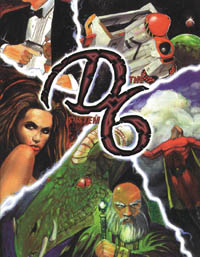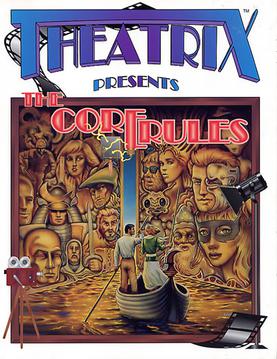
Fate is a generic role-playing game system based on the Fudge gaming system. It has no fixed setting, traits, or genre and is customizable. It is designed to offer minimal obstruction to role-playing by assuming players want to make fewer dice rolls.
In some role-playing game (RPG) systems, the dice pool is the number of dice that a player is allowed to roll when attempting to perform a certain action.

Savage Worlds is a role-playing game written by Shane Lacy Hensley and published by Pinnacle Entertainment Group. The game emphasizes speed of play and reduced preparation over realism or detail. The game received the 2003 Origin Gamers' Choice Award for best role-playing game.
Margaret Weis Productions, Ltd. is a games publisher located in Williams Bay, Wisconsin, United States and founded in 2004 after Margaret Weis and Don Perrin, the two founders of Sovereign Press, divorced.

The D6 System is a role-playing game system published by West End Games (WEG) and licensees. While the system is primarily intended for pen-and-paper role-playing games, variations of the system have also been used in live action role-playing games and miniature battle games. The system is named after the 6-sided die, which is used in every roll required by the system.

A role-playing game system, is a set of game mechanics rules used in a tabletop role-playing game (TTRPG) to determine the outcome of a character's in-game actions.

An attribute is a piece of data that describes to what extent a fictional character in a role-playing game possesses a specific natural, in-born characteristic common to all characters in the game. That piece of data is usually an abstract number or, in some cases, a set of dice. Some games use different terms to refer to an attribute, such as statistic, (primary) characteristic or ability. A number of role-playing games like Fate do not use attributes at all.

The Buffyverse role-playing games - the Buffy the Vampire Slayer and Angel role-playing games - are complementary, officially licensed role-playing games (RPGs) published by Eden Studios, Inc. The Buffy the Vampire Slayer Core Rulebook was published in 2002, while the Angel Corebook followed in 2003. Both games use a streamlined version of Eden Studios' popular Unisystem game engine, also featured in CJ Carella's WitchCraft and All Flesh Must Be Eaten, two of Eden's better-known original product lines. In both games, players are able to take on the roles of characters from the respective television series or create wholly original characters as they and their group see fit, effectively building their own Buffyverse series in the process.

A diceless role-playing game is a role-playing game which is not based on chance: it does not use randomisers to determine the outcome of events in its role-playing game system. The style of game is known as "diceless" because most games use dice as their randomiser; some games such as Castle Falkenstein use other randomisers such as playing cards as substitutes for dice, and are not considered "diceless".

The Supernatural Role Playing Game is a role-playing game by Margaret Weis Productions that was released in 2009. It is based on the television series Supernatural and was the final game to use the Cortex System.

Theatrix is a role playing game that was produced in 1995 by the now-defunct Backstage Press. It was unusual because, unlike most other role-playing games of the time, it did not use dice to resolve actions or determine success.
Now most commonly referred to as "Cortex Classic," the Cortex System is a generic RPG system based on the Sovereign Stone role-playing game system,, and was developed by Margaret Weis Productions, Ltd for the Serenity Role Playing Game. It was subsequently used for their licensed Battlestar Galactica and Supernatural RPGs, and brought out as a stand-alone system in the Cortex System Role Playing Game book. Serenity, using the Cortex System, was the 2005 Origins Award Gamer's Choice Role Playing Game of the Year.

A tabletop role-playing game, also known as a pen-and-paper role-playing game, is a classification for a role-playing game (RPG) in which the participants describe their characters' actions through speech, and sometimes movements. Participants determine the actions of their characters based on their characterization, and the actions succeed or fail according to a set formal system of rules and guidelines, usually containing Dice-Rolling. Within the rules, players have the freedom to improvise; their choices shape the direction and outcome of the game.
The Star Wars Roleplaying Game is a tabletop role-playing game set in the Star Wars universe, first published by Fantasy Flight Games in 2012. It consists of different standalone cross-compatible games where each one is a separate themed experience. The sourcebooks support games set from the Clone Wars era to the original Star Wars trilogy era; there is limited support for the Star Wars sequel trilogy era. Since 2020, the game line has been maintained by Asmodee's subsidiary Edge Studio.

Marvel Heroic Roleplaying is the fourth role-playing game set in the Marvel Universe published by Margaret Weis Productions under license from Marvel Comics. It uses the Cortex Plus system. The first volume was published in early 2012. In early 2013, Margaret Weis Productions announced that they would not be renewing their license and publication ceased.
The Cortex Plus System is a toolkit RPG system that evolved from Margaret Weis Productions, Ltd's Cortex System. It has been used for four published games and one published preview to date, and the design principles are in the Cortex Plus Hacker's Guide, a book of advice in how to create new games using Cortex Plus, and list of new games produced via Kickstarter. According to the Hacker's Guide there are three basic 'flavors' of Cortex Plus; Action, Drama, and Heroic.

The Smallville Roleplaying Game is a superhero-themed role-playing game published in 2010 by Margaret Weis Productions, set in the universe of the television series Smallville.

Leverage: The Roleplaying Game is a role-playing game based on the Leverage television series using the Cortex Plus system. It is known for its innovative use of flashbacks to reproduce the con or heist genre and was nominated for the 2010 Origins Award for Best Roleplaying Game.
Cam Banks is a game designer known for his work on the Cortex System line of roleplaying games as lead designer for Marvel Heroic Roleplaying, and the Big Damn Heroes Handbook supplement to the Serenity Role Playing Game, among other titles. He is the Cortex Creative Director for Fandom Tabletop, the publishers of Cortex Prime.
The Cortex System is a collection of related roleplaying games. Its most recent iteration, Cortex Prime, was designed by Cam Banks and initially published by Fandom Tabletop, then acquired by Dire Wolf Digital. Prior versions appeared in the licensed roleplaying games published by Margaret Weis Productions, where it was used as the house system. Cortex is an adaptable game system focusing on characterization and story development.









